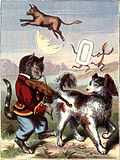Little Boy Blue
| "Little Boy Blue" | |
|---|---|
| Roud #11318 | |
 1901 illustration by William Wallace Denslow | |
| Song | |
| Written | England |
| Published | c. 1744 |
| Form | Nursery rhyme |
| Writer | Traditional |
| Language | English |
"Little Boy Blue" is a popular English-language nursery rhyme, often used in popular culture. It has a Roud Folk Song Index number of 11318.
Lyrics
The most common version of the rhyme is:
Little Boy Blue,
Come blow your horn,
The sheep's in the meadow,
The cow's in the corn;
Where is that boy
Who looks after the sheep?
Under the haystack
Fast asleep.
Will you wake him?
Oh no, not I,
For if I do
He will surely cry.
Some versions do not include the last two lines.
Older versions include:
Little Boy Blue,
Come blow your horn,
The sheep's in the meadow,
The cow's in the corn;
But where is the boy
Who looks after the sheep?
He's under a haystack,
He's fast asleep.
Will you wake him?
No, not I,
For if I do,
He's sure to cry.[1]
- ^ I. Opie and P. Opie, The Oxford Dictionary of Nursery Rhymes (Oxford: Oxford University Press, 1951, 2nd edn., 1997), pp. 98-9.
Origins and meaning
The earliest printed version of the rhyme is in Tommy Thumb's Little Song Book (c. 1744), but the rhyme may be much older. It may be alluded to in Shakespeare's King Lear (III, vi) when Edgar, masquerading as Mad Tom, says:
Sleepest or wakest thou, jolly shepheard?
Thy sheepe be in the corne;
And for one blast of thy minikin mouth
Thy sheepe shall take no harme.[1]
- ^ Cite error: The named reference
Opie1997was invoked but never defined (see the help page).
It has been argued that Little Boy Blue was intended to represent Cardinal Wolsey, who was the son of an Ipswich butcher, who may have acted as a hayward to his father's livestock, but there is no corroborative evidence to support this assertion.[1] The idea of a sheep eating in a meadow, or a cow eating in the grain field ("corn" means grain in this context) would have been horrifying to the people of the time, since heavy feeding on lush grass can make sheep sick (grass tetany,[2] for example) so the meaning of the rhyme was quite vivid in earlier times.
